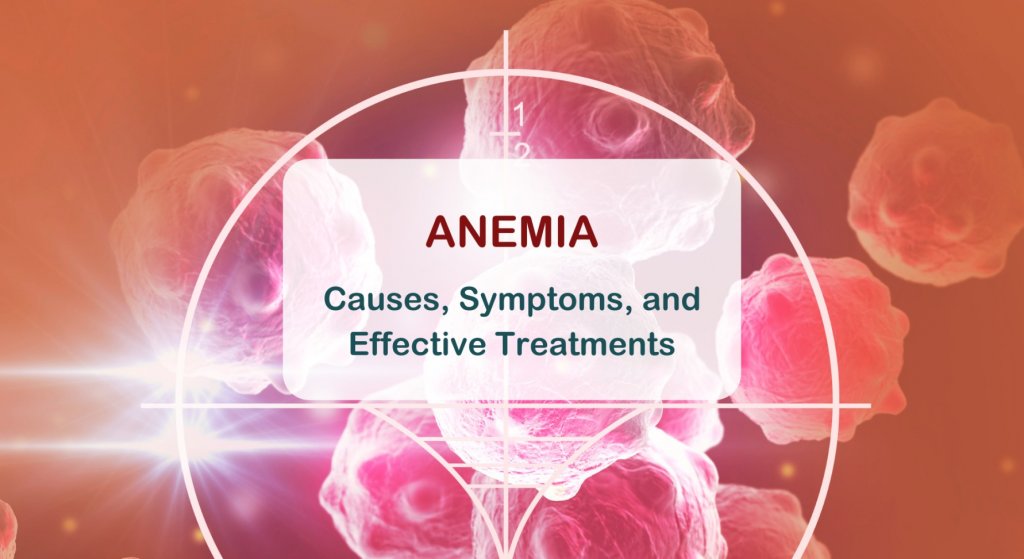
Anemia
Causes, Symptoms, and Effective Treatments
Anemia is a common blood disorder that affects millions of people worldwide. It occurs when the body lacks enough healthy red blood cells to carry adequate oxygen to the tissues. This condition can lead to various symptoms and, if left untreated, can have serious health implications. Understanding the causes, symptoms, and treatments for anemia is essential for effective management and improved health outcomes.
What is Anemia?
Anemia is characterized by a deficiency of red blood cells or hemoglobin, the protein in red blood cells that carries oxygen throughout the body. When there are insufficient red blood cells or hemoglobin, the body’s organs and tissues do not receive enough oxygen, leading to fatigue and other symptoms.
Causes of Anemia
Anemia can be caused by a variety of factors, which are generally categorized into three main types:
- Iron-Deficiency Anemia: This is the most common type of anemia and occurs due to a lack of iron in the body. Iron is essential for the production of hemoglobin. Causes of iron-deficiency anemia include poor dietary intake, chronic blood loss (such as from heavy menstrual periods or gastrointestinal bleeding), and the inability to absorb iron effectively.
- Vitamin-Deficiency Anemia: This type includes deficiencies in vitamin B12 and folate, both of which are necessary for red blood cell production. Causes can include a diet lacking in these vitamins, certain medical conditions that affect nutrient absorption, and the use of certain medications.
- Chronic Disease Anemia: Conditions such as chronic kidney disease, cancer, and rheumatoid arthritis can interfere with red blood cell production. These chronic conditions often lead to a decreased lifespan of red blood cells or impaired production.
Symptoms of Anemia
The symptoms of anemia can vary depending on its severity and underlying cause. Common symptoms include:
- Fatigue and weakness
- Pale or yellowish skin
- Shortness of breath
- Dizziness or lightheadedness
- Cold hands and feet
- Chest pain
- Headaches
- Irregular heartbeats
In severe cases, anemia can cause significant health problems, including heart failure and severe organ damage
Diagnosing Anemia
Diagnosis typically involves a combination of medical history, physical examination, and laboratory tests. The most common tests include:
- Complete Blood Count (CBC): This test measures various components of the blood, including red blood cell count, hemoglobin levels, and hematocrit (the proportion of red blood cells in the blood).
- Peripheral Blood Smear: This test examines the size, shape, and color of red blood cells under a microscope.
- Iron Studies: These tests measure serum iron, ferritin (a protein that stores iron), and total iron-binding capacity (TIBC) to evaluate iron levels in the body.
- Vitamin B12 and Folate Levels: These tests determine if deficiencies in these vitamins are contributing to anemia.
- Reticulocyte Count: This test measures the number of young red blood cells in the blood, indicating how quickly red blood cells are being produced by the bone marrow.
Treatment of Anemia
The treatment of anemia depends on its cause and severity. Here are some common treatment approaches:
- Iron Supplements: For iron-deficiency anemia, oral iron supplements are typically prescribed. In severe cases, intravenous iron may be necessary.
- Vitamin Supplements: For anemia caused by deficiencies in vitamin B12 or folate, supplements or dietary changes are recommended. In some cases, vitamin B12 injections may be required.
- Dietary Changes: Incorporating iron-rich foods (such as red meat, beans, and leafy green vegetables), vitamin C (which enhances iron absorption), and foods rich in vitamin B12 and folate (such as eggs, dairy, and fortified cereals) can help manage anemia.
- Medications and Treatments for Underlying Conditions: Treating the underlying condition is essential for chronic disease anemia. This may involve medications to control inflammation or other specific treatments based on the disease.
- Blood Transfusions: In cases of severe anemia, blood transfusions may be necessary to increase red blood cell counts and improve symptoms quickly.
- Erythropoiesis-stimulating agents (ESAs): These are medications that stimulate the bone marrow to produce more red blood cells. They are often used in cases of anemia associated with chronic kidney disease or chemotherapy.
Preventing Anemia
Preventing anemia involves addressing its potential causes. This can include:
- Balanced Diet: Ensuring a diet rich in iron, vitamin B12, folate, and vitamin C can help prevent deficiencies.
- Regular Check-ups: Regular medical check-ups can help detect anemia early, especially in individuals with risk factors such as chronic diseases or heavy menstrual periods.
- Managing Chronic Conditions: Proper management of chronic conditions can reduce the risk of anemia.
Conclusion
Anemia is a condition that requires proper understanding and timely intervention. By identifying the underlying causes, recognizing the symptoms, and seeking appropriate treatment, individuals can manage anemia effectively and maintain their overall health. If you suspect you have anemia, it is important to consult with a healthcare provider for accurate diagnosis and tailored treatment options.
Related posts:
- Combating Childhood Obesity: Effective Solutions for a Healthier Generation
- The Surprising Link Between Gut Health and Stress: The Gut-Brain Connection
- Healthy Aging: Secret Tips for Vitality and Well-being as You Age
- Understanding Anxiety: Symptoms, Causes, and Coping Strategies
- Asthma and Allergies: Understanding Triggers and Treatments
